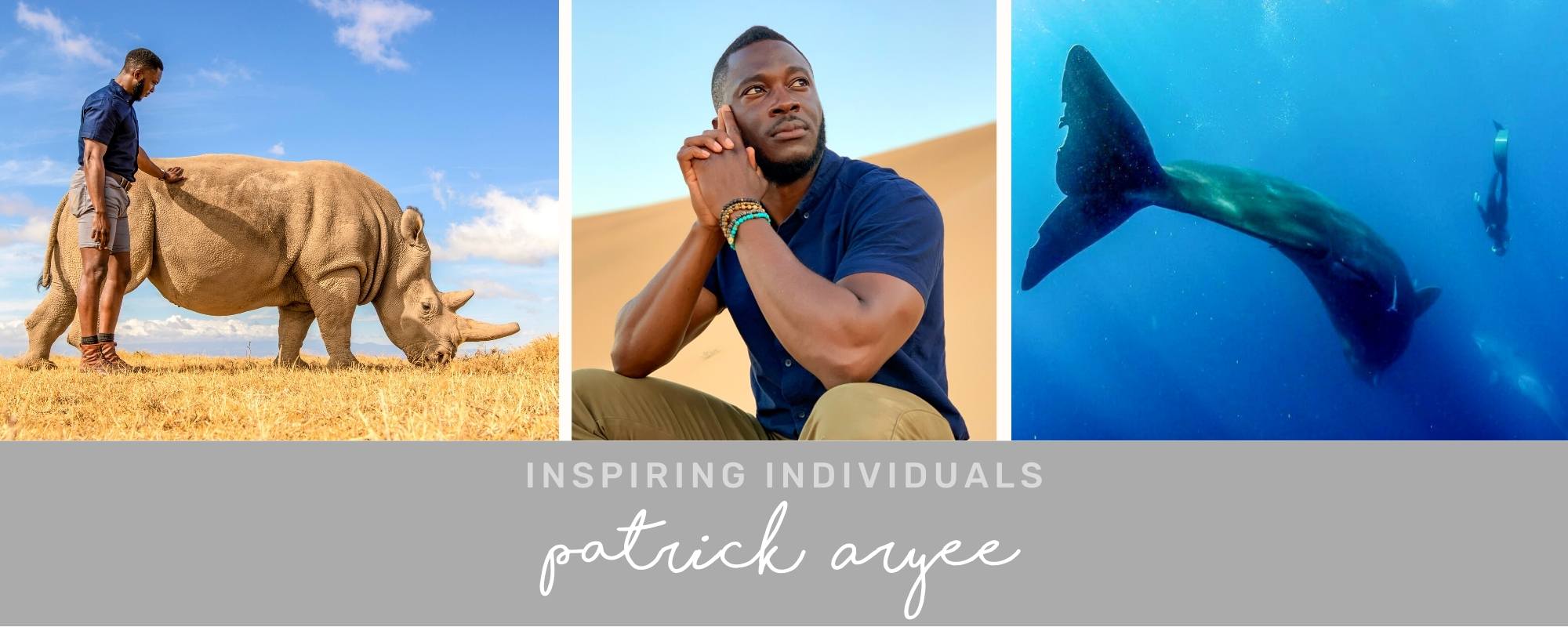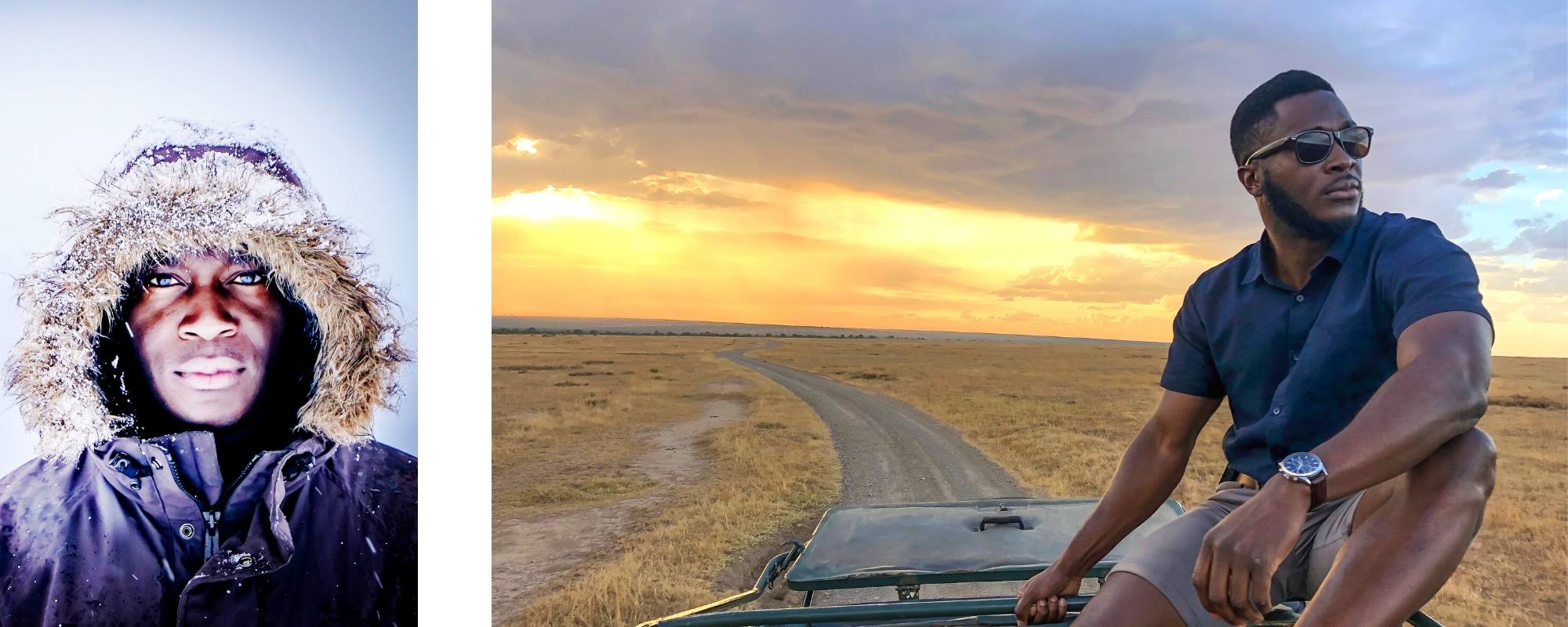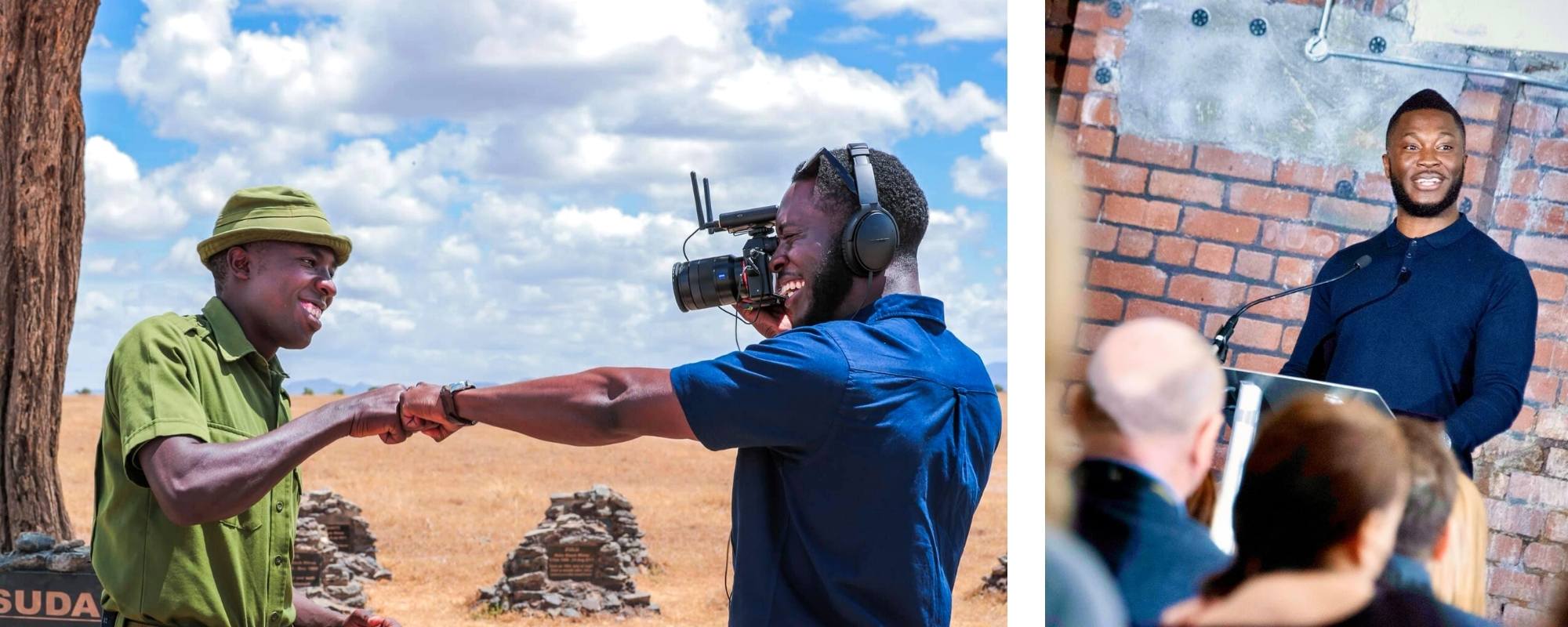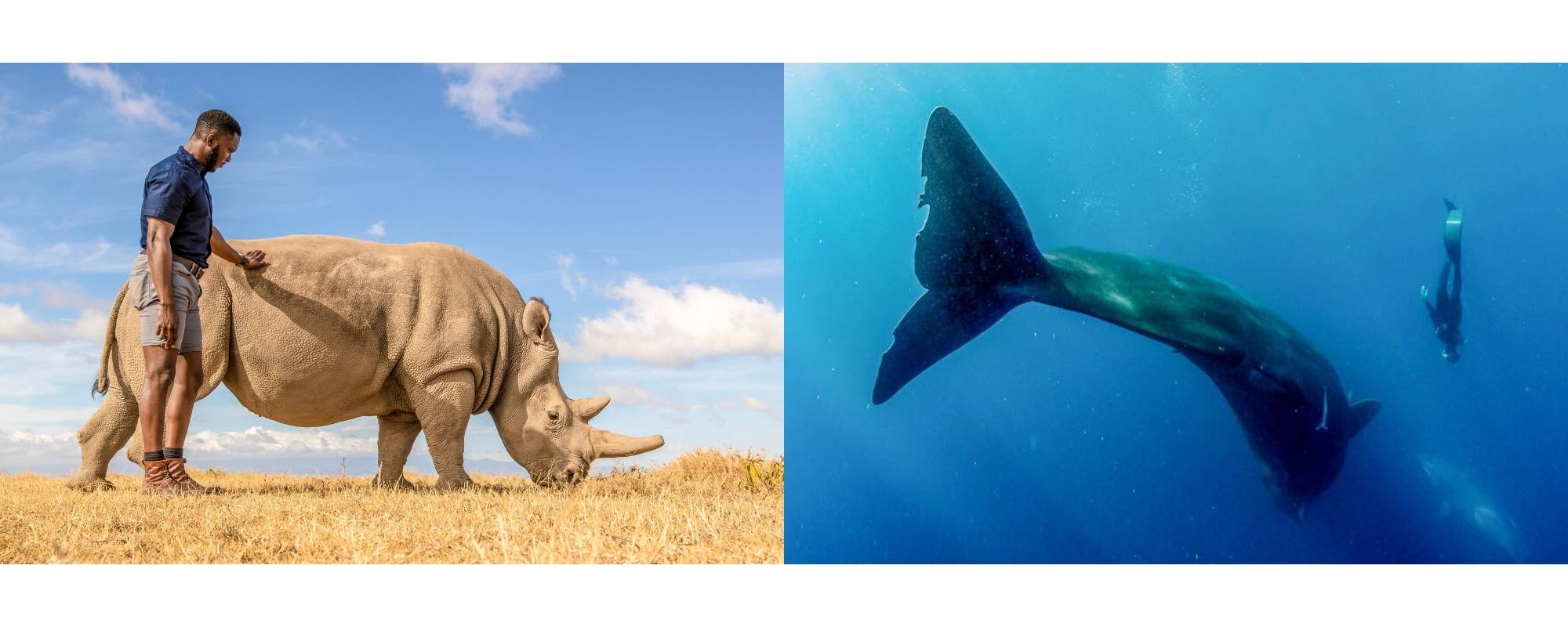
INSPIRING INDIVIDUAL: PATRICK ARYEE
Posted on
Patrick Aryee has been behind the scenes on David Attenborough documentaries that have left the world in awe of Earth’s majestic places and aware of the deep conservation issues our planet faces.
Patrick worked his way up in the BBC Natural History Unit and his on and off-screen achievements would certainly make his younger self proud.
Hard work, passion, energy, and self-belief have helped Patrick pave the way to a career path he leads with exceptional talent.
Everything he does comes back to the theme of biodiversity conservation, and setting an example for the new generation of conservation warriors.
A fascinating man and an Earth advocate, Patrick Aryee is nothing short of inspiring and we are honoured to introduce our Wild Tribe to him in this interview!

Please tell us about yourself
Jambo! Hello to everyone at Wild in Africa and also to all your readers & followers. My name's Patrick Aryee, I’m a British-Ghanaian TV presenter and wildlife filmmaker.
Much to the envy of my friends, I have the fortune of travelling the globe to capture the wonder of Mother Nature through the perspective of the flora & fauna that surrounds us.
For me, it’s the stories about conservation and those that have a sense of adventure that I most enjoy getting involved with, particularly those in and around Africa.
Can you tell us a little bit about your professional background
Well, it all started behind the lens, and in front of the telly. As a kid I watched a lot of TV, so in retrospect it makes sense that I ended up pursuing it professionally. Even at a young age I recognised the power of visual media, how in an instant you could be transported to a different part of the world, or, to an entirely alien one if you so desired; FYI if you haven’t already guessed it, I’m a big fan of sci-fi!
My first proper TV gig was as a Runner with the BBC Natural History Unit. Over the course of five years, I steadily worked my way up to Assistant Producer. It was challenging to say the least, but I won’t bore you with the details.
What I will tell you is the coolest thing about that journey was getting to work with the legend himself, Sir David Attenborough, and for an entire year - that was awesome! Following somewhat in his footsteps, I eventually got my big break after relentlessly pushing for a screen-test; it’s a bit like an audition and was the best way, at the time – a time before you could ‘make it big’ as a YouTuber or TikTok star – to become a presenter.
I finally, got the chance to showcase my skills, not that I really knew what I was doing. Luckily for me the executive producers and commissioners saw something in me that they liked. That paved the way for my first ever TV show, Super Senses: The Secret Power of Animals, and the rest is history!
What or who in your life influenced you to pursue this route
Growing up I had two passions in life: the first being science, which most people know about, and the other being the dramatic arts. I loved performing on stage; acting, singing, dancing, whatever it was you could count me in.
Equally, I had two major influences in the form of TV shows. The first was Tomorrow’s World - a BBC series from the 90s that covered all the latest developments in science & tech. In fact, I still remember the episode that revealed how something called ‘broadband’ internet would soon replace dial-up (I’m showing my age here).
The other was a little-known US comedy out of LA, called The Fresh Prince of Bel Air, I dunno, you might have heard of it. Joking aside, seeing Will Smith’s performative range stoked within me an inner fire that still burns bright to this day. Remember this was the 90’s, so seeing a super successful black artist on my tv screen every week, who was (and still is) admired by people all around the world, filled my heart with a steady stream of inspiration, with extra sauce on the side!

Currently, what is the inspiration that keeps you motivated and passionate about your work
I’m inspired when I see how passionate young people get about conservation issues.
People from all walks of life are using their voices to fight for a better future and are really invested when it comes to the preservation of the world’s habitats.
It’s funny, over the past five years alone, things have changed so fast and I think social media has played a huge role in that.
We have the Extinction Rebellion movement which sparked a wave of global protests; Leonardo DiCaprio producing powerful documentaries like Before the Flood, and Mark Ruffalo is dedicating his time to campaign as a political climate-change activist. There is a deep desire for positive long-lasting change.
Let’s sit back and appreciate that for just a moment: Jack Dawson from Titanic and The Hulk from Avengers are basically modern-day equivalent of The Planeteers – my Gen Z gang might have to Google that one!
But most of all, it’s the The Black Lives Matter movement which has re-energised me to uncover in-depth stories about Africa, not only about her awe-inspiring landscapes & animals, but more so about her people, native Africans, and the global African Diaspora that are so often underserved.
Wildlife documentarians have a unique opportunity to share uplifting stories about the black community and of their ecological heritage & birth right; I’m excited to be a part of that.
What is the most impactful aspect of your work
I think that’s a tricky one to accurately assess.
If I were to have a guess though, I’d say that the most impactful aspect is seeing how my work inspires others.
I’ve had loads teachers reach out over the years to express how much they’ve enjoyed the wildlife films I’ve made; some even use my docs as part of their lessons. I might have to start charging them. So yeah, I think that’s pretty cool if you ask me!
Where is your favourite place you’ve travelled and why
That’s an easy one, Namibia!
It’s such a beautiful country, it’s also sparse and extremely dry – I think that’s why I like it so much, no mosquitoes!
The country’s famed for its desert landscapes, the most notable being the baked interior of the Kalahari, and the coastal Namib Desert; the latter is often referred by its nickname, the Skeleton Coast, after the giant bones that once littered the shore from the whaling industry. Ironically it’s the skeletal remains of over a thousand ships that now line the waters edge.
It’s also the place I “first saw the stars”. With little to no light pollution it’s the perfect place to stargaze. Looking up at the night sky the streak of the Milky Way is clear for all to see, the stars each dancing with their own character and colour – picture Tinkerbell sprinkling multi-coloured fairy dust across the cosmos and you’ve got it. Simply breath-taking!
Tell us about your strangest experience while traveling
My strangest, and definitely one of my coolest experiences while travelling, was again in Namibia.
We’d made our way to the Gobabeb Research Station in the Namib Desert. Our mission, to track down an elusive nocturnal creature that leaves no trace other than strange indentations between the tall mounds of tussock grass that dot the desert dunes.
I’ll never forget the moment I saw it! The team and I approached the site where the day prior we’d setup a pit trap made from a ribbon of corrugated plastic, a bucket, and lots of sand. An elaborate and harmless means of coming face-to-face with my intended co-star.
I approached the bucket and carefully dipped my hands into the warm sand. “There’s nothing in there” I said, “just a small rock at the bottom”. One of the field researchers whispered in hushed tones, “Go for the rock!”.
I carefully took hold of the rock, which had since come alive, shifting around cautiously. With my hands clasped around this precious cargo, I gently raised it up out of the bucket.
The excess sand slowly trickled down between my fingers and there it was, a Golden Mole.
It’s fur – shimmering with golden iridescence in the African sun – covered virtually every inch of its body including its non-functional eyes. Everyone was blown away by this seemingly magical creature.
What was most surprising was how strong it was. Considering their size, they have exceptionally muscular shoulders, an adaptation to help them better dig and ‘swim’ through the sand.
Stunning little things!

Why do you feel that wildlife conservation is important
In this day and age, I think we’re all aware of the importance of wildlife conservation.
There’s only one place in the universe that we know of that harbour’s complex life. Planet Earth.
Seen from space we are but a tiny blue marble in an endless sea of emptiness. This blue marble is like a life-raft, gently cradling the most wondrous creation of the cosmos!
As humans we now have the power to directly affect this biosphere, for better, or for worse. Wildlife conservation is ultimately about living in balance and harmony with the planet’s ecosystems.
Removing a keystone species from an ecosystem can have catastrophic effects, likewise their return can result in wonderous natural beauty. Take the reintroduction of the Yellowstone wolves for example. The return of these long-persecuted predators restored an age-old balance between wolves and elk. As elk numbers dropped closer to their previous numbers, the willow trees could finally recover from the decades of intense browsing & feeding, and in so doing provided an abundant food source for one of nature’s greatest engineers, beavers. With beavers flourishing once again, they built new dams and ponds, recharging the water table of the Greater Yellowstone Ecosystem and provided larger, healthier habitats for invertebrates, fish and waterfowl.
It’s all about connectivity.
What is your favourite Wild in Africa bracelet style and why
The Big 5 stack. I love the blend of dark rich tones accented by the pastel blues. Subtle but styled, definitely my kinda style.
Are there any animals you feel especially passionate about
That would hands down, have to be Najin & Fatu – the last Northern White Rhinos on the planet. I had the great fortune of meeting these gentle giants face-to-face. They live at the Ol Pejeta conservancy in Kenya, where they’re continuously watched over and protected by 24-hr armed guard. Those wildlife rangers are just astonishing human beings, I’d love to make a documentary film about their lives.
Although they’re functionally extinct – with the last male passing in 2018 – there is a slim chance that scientists can bring them back from the brink using revolutionary IVF techniques, which would result the birth of a northern white rhino for the first time in over 20-years.
I’m keeping a close eye on their progress; for anyone that wants to support them, you can make a donation to one of their supporting charities, Helping Rhinos.
Can you share your future plans and hopes for yourself
What does the future hold? Well, according to my crystal ball, more mind-blowing animal encounters. At least I hope so!
For anyone that wants to check out my shows, they’re available through Sky OnDemand and NOW TV. Titles include the Amazing Animal Family strands, Big Beasts: Last of the Giants, Wild Animal Babies with my latest, Extreme Animals: One Wild Day. I’m also making a lot of content for my new YouTube channel ‘Patrick Goes Wild’ so I’d definitely check that out.
Long term, my aim is to own a media production company that taps into the power of immerging content creators. Social media is big business, and it offers up an exciting opportunity to collaborate with big name brands.
It’s a goal of mine to produce impactful films, like My Octopus Teacher (filmed in South Afica) that can be shared, viewed, and accessed, at any time, by anyone, from anywhere around the world, free of charge.
Ambition aside, I’ve so much insider knowledge and experience to share, all of which I wish I knew sooner.
The media industry can be an absolute savage, but it’s also a community and an artform that has the power to change the world for the better. With the right team around you, you can have a lot of fun doing it too! It’s been a long road to get to this point, so I want to try and be the person that I needed all those years ago.
You asked earlier, ‘what does the future hold?’ Nurturing the next generation of talent; they are the future!
Don’t miss out on future posts so be sure to sign up for our Wild Tribe (scroll below to sign up).
New products and discounts first!
RETAIL STUDIO
The Farm House, R527
Hoedspruit LP South Africa
. . . . . . . . .
HEAD OFFICE
65/2 Arbor Ave, Robina
QLD 4226 Australia
. . . . . . . . .
contact@wildinafrica.store
